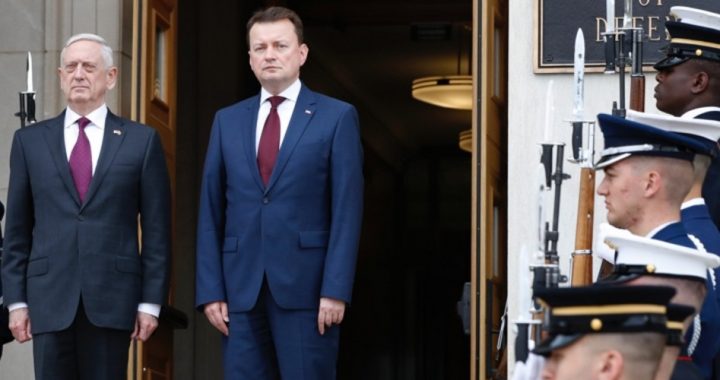
Poland’s defense minister, Mariusz Blaszczak (shown, right), said on May 28 that he has held talks with U.S. officials about having thousands of U.S. troops permanently stationed in Poland, presumably as a deterrent to possible Russian incursions.
Army Times quoted a Polish defense ministry statement that there is a “clear and present need for a permanent U.S. armored division deployed in Poland,” for which Poland is willing to provide financial backing that could reach $2 billion.
The “clear and present need” outlined in the document appeared to be prompted by possible threats from Russia.
“Establishing such a force is necessary to present an unequivocal challenge and deterrence to Russia’s increasingly emboldened and dangerous posture that threatens Europe,” the proposal reads.
The document cites the Trump administration’s 2017 National Security Strategy, which identified Russian aggression in Georgia in 2008 and in Ukraine in 2014 as threats to the United States and global stability.
“As shown in Ukraine, Russia is capable of effectively deploying hybrid warfare through its annexation of Crimea, cyberattacks on Ukrainian infrastructure, and fueling separatists,” the document reads. “An increased U.S. permanent presence in Poland will give America the strategic flexibility it needs to confront and deter these threats.”
U.S. Defense Secretary Jim Mattis (shown, left) welcomed Blaszczak to the Pentagon on April 27 and said that “the United States and Poland have a long-shared history of military cooperation and understanding.” Mattis said:
Today, the bond between our two nations’ militaries and our people remain strong. And we thank you for Poland’s continued hosting of U.S. and NATO forces, and for your contribution to the Defeat ISIS campaign and Resolute Support Mission in Afghanistan.
While Poland’s offer to subsidize the U.S. troop presence might serve to mitigate the financial burden of stationing those forces, it does nothing to alleviate the biggest objection that noninterventionists will make — it entangles the United States in a foreign alliance where we might get bogged down in yet another overseas military operation.
Photo: AP Images
Related article:



